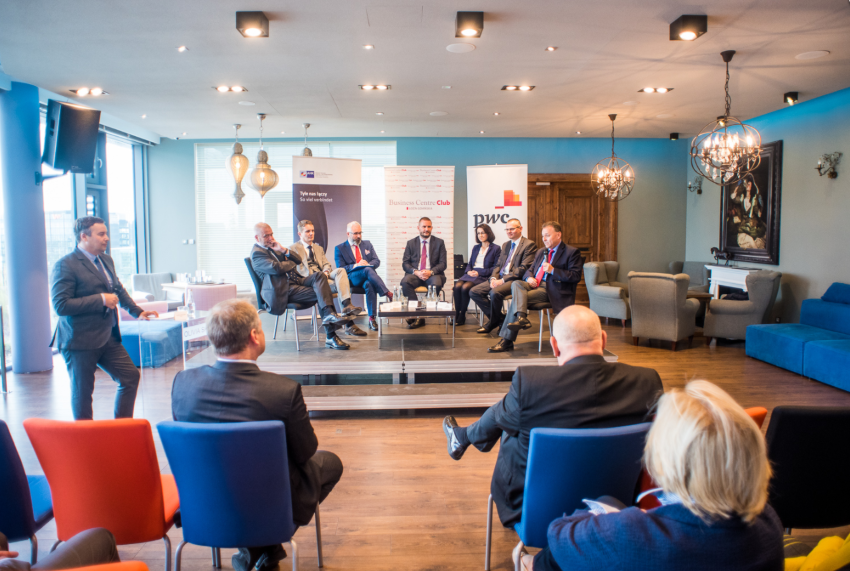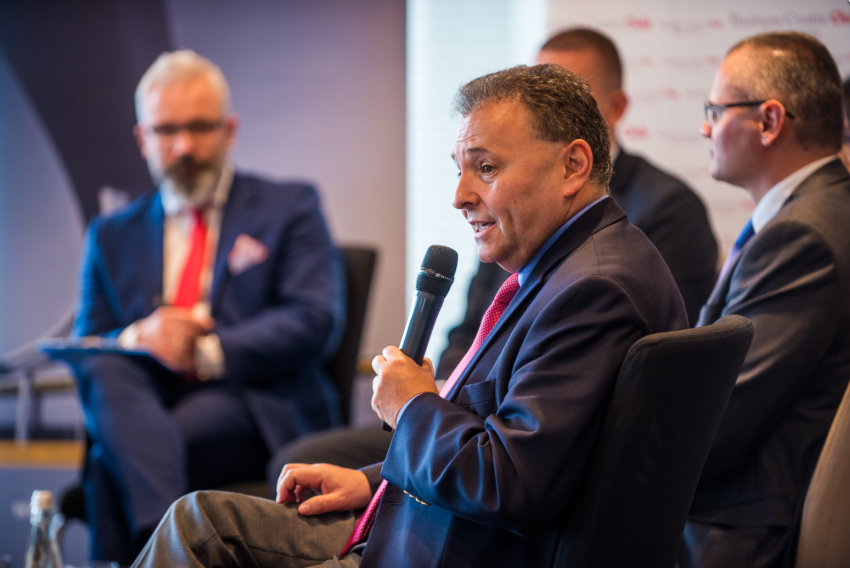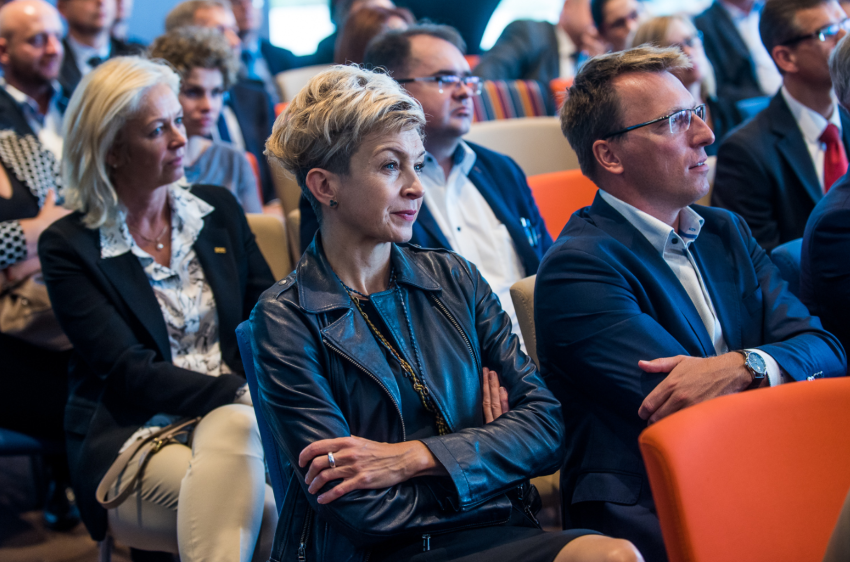“You have to learn how to live.” Interview with Prof. Witold Orłowski m.in. About the fact that in order to understand the modern world, you have to learn to constantly change yourself.
The socio-economic life of Pomerania is concentrated in Olivia Business Centre. Numerous conferences and workshops are held here, which serve the purpose of integration, exchange of knowledge and mutual inspiration. Often, the main topics of such meetings are current trends affecting the development of business and human capital. Olivia is a space for numerous debates and discussions on the most important issues concerning, for example, the current socio-economic challenges faced by the inhabitants of Polish, including Pomerania. Olivia allows you to participate in activities that engage, stimulate and make you think.
On 19 September 2017, Olivia hosted a debate on such an important issue as “Is the euro needed by the Polish economy?”. The organizers of the event were the Gdańsk Business Centre Club Lodge and PwC. The invitation of the Organizers to participate in the meeting was accepted by distinguished guests: Prof. Witold Orłowski, Chief Economic Advisor to PwC, former Economic Advisor to the President of the Republic of Poland and Prof. Dariusz Filar, economist and lecturer at the University of Gdańsk, former member of the Monetary Policy Council. The hosts of the debate were: Maciej Dobrzyniecki , Vice-President of the BCC Board, Chancellor of the Gdańsk Lodge, Katarzyna Dobrzyniecka, Director of the Gdańsk Lodge and Paweł Ożarowski, PwC Partner. The following took part in the discussion: Michał Makowski, Director of the Gdańsk Repair Shipyard, Rafał Dobranowski, Head of the Drutex Legal Department, Lidia Ziaja, Drutex Shiprepair Yard Manager. Bartosz Ziaja, Vice-President of the Management Board of Ziaja and Robert Raszczyk, Deputy Managing Director of BRANDS Polska sp. Ltd.

Fig. Maciej Czarniak / Trojmiasto.pl
–/–
We invite you to read interviews with Professor Witold Orłowski, macroeconomist, publicist, chief economic advisor to PwC, on the main macroeconomic processes taking place in the world, the policy of Poland’s accession to the Polish Eurozone, the impact of modern technologies on communication and the art of establishing relationships in the world of global business and the ability to acquire the most important competence of the future – openness to the process of continuous learning.
–/–
Monika Bogdanowicz (Olivia Business Centre): Professor, you say about yourself: “I am an economist who tries to understand what is happening in the world”. Just two years ago, we had a different situation in global politics. At the time, you wrote: “Donald Trump’s economic program contains many nice-sounding generalities: lower and simpler taxes, less bureaucracy, more favorable conditions for business. However, there is also a clear proposal to break with the current policy of openness to trade, and especially to break the agreements on free economic cooperation between the US and the countries of America and the Pacific basin. And in the background of all this – the prospect of a trade war with China. If Trump really won the election, and if he really started to pursue such a policy consistently, the effects could be really far-reaching. In short, the world we have become accustomed to, the world of globalisation and the free movement of goods and capital across borders, could end sooner than we think.” * How does this scenario stand up to the test of comparison with reality and current developments in the economic arena of geopolitics? Do these forecasts still have the possibility of becoming realistic?
Prof. Witold Orłowski: So far, nothing has really changed. I mean, we still live in a world where the market, after all, is functioning and globalization has not been stopped. The crisis that started a decade ago is not really over yet, we still don’t have a normal economic situation. At the same time, we see political and social changes, which are to a large extent the effect and reflection of economic changes. We can see it in the rise of populism in many countries that we have previously considered immune to such phenomena, starting with the United States. After all, no one there expected that you could win elections by being a populist.
So far, Donald Trump has not accomplished anything great among the things he announced. And which he still can. So we don’t know how the story will turn out. We also don’t know if Donald Trump will be followed by another president, even more radically populist. We live in very difficult and uncertain times. So what the scenarios of the world’s development will be, we will see. There may well be some calming down as well as an escalation of problems.
In Europe, after the election of Emmanuel Macron as president of France, i.e. after the defeat of the populists, it has become fashionable to say that “the wave of populism has swept over, now everything will start to calm down, the economy is getting back on track, societies are starting to accept what has happened and we will slowly return to normality”. But we can also imagine a very different political scenario. A scenario in which, for example, in 3 years’ time, Macron’s popularity, which has already plummeted, will be only 5%…
MB: It’s true, today we can observe that President Macron is failing to fulfill his election promises. In the long run, voters may not be able to forgive him.
WO: Then we may have to deal with a repetition of the fear, only even greater. As I mentioned, after President Trump, there may be another, even more populist, not only in the area of declarations, but also in the implementation of his promises.
Thus, there is a scenario of a global, gradual calm, as well as a scenario of growing problems, especially in the Western world.
Add to this the rise of developing countries, especially China and India. This is taking place, as we know, at the expense of the influence of the West, and I would like to remind you that the West is not only a political community. It is also a community of values that we believe to be right. On the other hand, a world in which Western values are on the defensive is one that will be worse from our point of view. A world in which democracy, freedom, human rights, etc., will matter less.

Fig. Maciej Czarniak / Trojmiasto.pl
So, on the one hand, we have global changes that we cannot stop and that in some way limit the role of the West. On the other hand, in the very Western world in which we live, we have the two scenarios already mentioned: calming and rebuilding economic and social harmony versus an escalation of upheavals.
Finally, there are countries like Russia, which have been expected for a very long time to become Western countries and share the same values as the West. At the moment, these countries are moving further and further away from this vision.
MB: Moving on to the areas of European politics closer to us, I would like to ask whether it is realistic for more countries to leave the EU. Do these tendencies have a chance to be stopped? Or will it be possible to maintain the conviction that the benefits of being in the union are superior?
WO: The border dividing Europe into countries that are very involved in integration processes and those, especially in our part of Europe – although I do not mean all the countries of the region – where there is no such involvement is becoming more and more clear and visible. Unfortunately, Poland is one of the countries whose societies are beginning to be less convinced of the sense of European integration.
So the question arises whether everything will calm down and we will return to normality, harmony and cooperation, or whether we will go in the direction of further aggravation of the situation. We don’t know that yet, and both positive and strongly negative scenarios are possible.
In this context, let us also take into account the problems of the world, such as emigration. This is not our choice, but a situation that is likely to occur constantly. In Africa, we are dealing with a continuous increase in population, and progressing climate change will probably “push” its inhabitants out of the continent. Therefore, we may then have to deal with further intense waves of emigration. These are all problems of very high importance.
Some of them are beyond our control, some of them are challenges in which we participate and have prepared for ourselves, being a society belonging to the group of countries of the Western world and the European Union.
MB: We are meeting in a situation where there is no binding decision on the introduction of the euro in Poland. Is the euro necessary for the Polish economy and what benefits could we have if Poland made efforts to join this zone?
WO: The issue of the euro is neglected by our politicians. According to them, it is a dead topic that will never come back, will never be important. However, I can very well imagine that in 5 years’ time the question of the euro will still be an open question. It is possible that our entry into the eurozone may then be paid for with much greater effort than we would put into this process today. Today, we could easily do that if we wanted to.
We are a member of the Union, we are committed to adopting the EU’s common currency, and I am convinced that the euro, whatever the problems it has had, will be a powerful currency and that the euro area will be the nucleus of the European market. I cannot say exactly when this will happen, but I think that sooner or later Poland will want to re-enter the eurozone. Even if today the declarations are such that we are not interested in the euro, and the majority of Poles agree with such a statement.
However, in my opinion, the balance is positive for the introduction of the euro in Poland. The main benefit of the euro for a country like ours is that we have access to cheap capital, with which we can modernise the economy and thus grow faster. If a country uses the euro properly, it will grow faster. Of course, the last decade has also taught us that there are some pitfalls associated with this currency.
MB: Does the economic development of Polish have a chance to catch up with the leading EU countries in the near future?
WO: I don’t know if Poland will catch up with Germany in our lifetime. On the other hand, I believe that, if the right policy is in place, the adoption of the euro would speed up the process. I’m pretty sure of that.
MB: We are at the threshold of a new academic year, so I wanted to ask you about the relationship between education and new technologies. New technologies are becoming more and more bold in this environment in order to make learning time more flexible and reduce spatial distance. Do students who meet only twice a semester in the university spaces lose the opportunity to establish real relationships with lecturers and colleagues or, for example, their potential business partners?
WO: The world is changing and it is always accompanied by assessments of the direction of change. Usually, if we are used to something, we think that the “other” world is an inferior world. We used to be used to face-to-face contact, so we believe that contact via electronic tools and the Internet is also something worse. In this way, we are certainly missing something. On the other hand, however, we also gain something. For example, young people consider it a waste of time not to enjoy the benefits of the online world.
MB: And what about creating relationships, which are so important in business? After all, it will be much more difficult to establish such a real bond in a virtual space?
WO: You have to look for a reasonable compromise and remember that today, if you work in a company that operates in many countries, people have to get used to the fact that a huge part of the contacts take place virtually. Teleconferences are replacing regular meetings and real travel. This is now a standard in most organizations. This does not mean, however, that such real meetings will be a thing of the past. You just have to get used to it and learn to live with both of them and be able to build relationships, even though we are in fact more and more in touch through channels other than meetings in the real world.
I think we’ve all had to deal with a situation where we know someone well, and if we think about it, we come to the conclusion that we don’t even know what that person looks like. We’ve been in touch with her for years, exchanging only emails. Of course, we can use Skype (ed.:laughs).
I don’t think it’s necessary and it’s not worth taking offense at technological changes. You have to learn to get the good out of them. You have to learn how to live.
The world is no better or worse than it was 20 years ago. Now it’s just different. Young people are used to contact mainly through smartphones and the internet. Whether we like it or not, it’s their way of communicating. That’s how they establish a relationship, and that’s certainly how they will continue to do so in the future. All we have to do is accept it.
Of course, sometimes there is a problem when people who are 20-30 years apart talk to each other. There is then a big difference in the ways and in the language of communication. But understanding and acceptance are always important. After all, the world is constantly changing.

Fig. Maciej Czarniak / Trojmiasto.pl
M.B.: I wanted to ask you about the professions that are most needed today. What is worth learning, who to be? What to choose so that a few years of learning are not wasted and you can effectively develop your potential?
W.O.: There are no answers to these questions. There are, of course, professions that we know are and will be needed. For example, a computer scientist. The demand for this profession is growing, and quite rapidly. However, this is such a specialized field that not everyone can be a computer scientist.
In general, a person should be prepared for the fact that he may encounter very different requirements at work. Above all, they must be flexible, able and willing to learn. Secondly, he will probably have to change jobs many times during his lifetime, perhaps even radically. Which means that more important than specific knowledge or a specific profession is the ability to educate and learn continuously.
In other words, specialists in specific fields will always be needed. However, the ability to learn is more important than learning, at a given moment, a specific trade. The truth is that the profession we are learning now may be completely useless in 10 years’ time, because, for example, it will be completely taken over by robots.
MB: So the most important value in modern education is the skilful shaping of young people’s openness to constant learning of new things and openness to the changes brought about by the world?
W.O:. Yes, such an attitude is certainly the surest guarantee and policy for a good future.
MB: Thank you for this inspiring conversation.
–/–
Images courtesy of Trojmiasto.pl. Author of the photographs: Maciej Czarniak.
The full photo gallery from the meeting is available on Trojmiasto.pl
–/–
Prof. Ph.D. Witold M. Orłowski – Professor of Economic Sciences, Rector of Vistula University, Chief Economic Advisor to PwC Poland, and Chairman of the Board of Trustees of the National Museum in Warsaw. From 2010 to 2015 he was a member of the Economic Council of the Prime Minister, from 2014 to 2015 he was a member of the chapter of the Economic Award of the President of the Republic of Poland, from 2001 to 2005 he was the head of the team of economic advisors to President Aleksander Kwaśniewski. He studied at the University of Lodz and Harvard University. From 1993 to 1997 he worked at the World Bank. In the past, he was also an advisor to the Chief Negotiator of Polish’s membership in the European Union, Special Advisor to the European Commission, a member of the Macroeconomic Council of the Minister of Finance, an advisor to many national and international organizations. Author of 11 books and 200 scientific publications, popular economic commentator and columnist for major Polish newspapers. Member of the National Development Council established in 2010. by the late Lech Kaczyński, President of the Republic of Poland.
* Witold Orłowski’s blog, http://witoldorlowski.natemat.pl/187731,donald-trump-i-globalizacja




